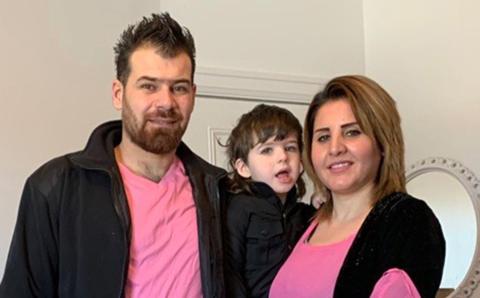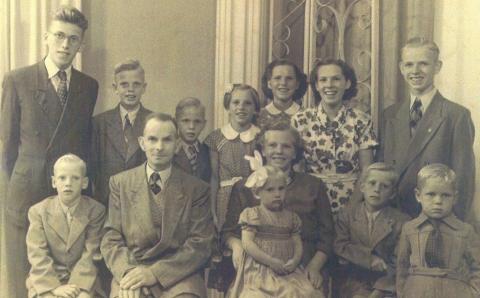She walked into church with her girlfriend late most Sundays.
I felt the nudge of the Holy Spirit. Her. Go talk with her. I had been speaking on stages for years, seeking to bridge the gap between LGBTQ+ people and churches, but the Holy Spirit had recently pushed me further. You don’t get to wait until people reach out to you. Go to them.
For months, I simply prayed for her, and then I got an idea. “You’re welcome to sit with me and my family,” I said after introducing myself. Her name was Kat. “We’ll always save you a seat.” We did.
She thanked me and then asked about my job. “I’m trying to bridge the gap between LGBTQ+ people and the church,” I said, hoping she didn’t want to fight.
She didn’t. Instead, she reached out: “I’m so tired of what the world says I am. I want to know what God says. Will you meet with me?”
“Of course,” I said, not knowing so much about her.
I didn’t know that 10 years before, she had walked away from God to live the life she desired. I didn’t know that one year before, she had decided to go to church again and broke down because of the power of the Holy Spirit. I didn’t know that recently she had been talking to a therapist about transitioning from female to male. I didn’t know she soon wanted to marry her girlfriend. I didn’t know she had been waking up at night sometimes “gasping for God.”
I didn’t know that simply asking her to sit with us would lead to a discipleship relationship that eventually led her to surrender her whole life to Jesus and do the stumbling, imperfect becoming-like-Jesus walk Christians do.
But God did.
“Yes. Of course,” I said to her message. I was ready to walk with her.
Why was I? And how can you be ready to take the discipleship walk alongside an LGBTQ+ person? After years of walking alongside LGBTQ+ friends, I offer you the first six steps I take:
1. Take a mirror to my heart
How do I actually feel about LGBTQ+ people—really feel? Angry? Scared? Grossed out? Apathetic? Annoyed? Why?
Dear straight friends, we cannot dream of taking a step alongside LGBTQ+ people until we have processed how we feel about LGBTQ+ people. If our heart lacks genuine love, we should not open our mouths until we unpack and confess to Jesus why not.
2. Know what I believe
Arguments rarely win a heart, but a lack of knowing what and why we hold to a traditional view of marriage and sexuality could halt our walking alongside someone.
The focus of this article is not to convince you of the arguments, but instead help you to do the discipleship walk. I encourage you to read and understand your denomination’s position (https://bit.ly/2L45x6I), or this other resource for a traditional view: bit.ly/2VgQHOJ. Then, when God has you engage an affirming LGBTQ+ person (someone who believes same-sex marriage is blessed by God)—and they really want to know why you believe what you do—you can graciously, humbly share a few reasons, and then ask them what they believe and why.
3. Walk differently with different groups of LGBTQ+ people
We cannot lump all LGBTQ+ people into one category—just like we cannot lump all straight people into one category.
So, yes, LGBTQ+ people need discipleship just like straight people do—but just as with straight people, we need not assume that because someone identifies as LGBTQ+ they need you to walk with them.
From my perspective as someone who has walked alongside various groups of LGBTQ+ people, here are some general ways we should walk alongside these different groups:
- LGBTQ+ people who hold the traditional view of marriage and sexuality, are surrendering their version of broken sexuality and gender to Jesus, and are imperfectly running after him
How do you walk alongside them? Like you would every other person in the church who is imperfectly running after Jesus. You champion them. You learn from them. You say you are proud of them. You disciple them only if they ask you to. You ask them to disciple you! These are your peers who may be even more mature than you are in some areas of the faith because they daily, hourly, perhaps every minute experience sacrifice for the kingdom of God.
- LGBTQ+ people who hold the traditional view of marriage and sexuality, are surrendering their version of broken sexuality and gender to Jesus, and are struggling to live it out
How do you walk alongside this group? You champion them. You learn from them. You say you are proud of them. If and when you get a real friendship going, you ask them, “How are you really doing?” If they say, “Not great,” that’s your invitation—not to “save” them from some evil quagmire, but to ask if they would like to walk the regular old gorgeous and challenging gospel journey alongside you. Please note: Your goal while walking with them is never to make them straight. Your goal is to help connect their heart to the heart of the Father, who empowers all of us, equally, to daily surrender our version of brokenness and walk well.
- LGBTQ+ people who hold the affirming worldview (they believe God’s design for marriage allows for same-sex marriage), declare Jesus as their Savior, and are in your circles
How do you walk alongside them? You love them as you would want to be loved. Don’t confront them about how they are living out their faith when you just meet them, if they are an online “friend,” or even if they are a family member with whom you are not close. “Do to others what you would have them do to you” (Matt. 7:12). Would you want a semi-stranger pointing out areas in your life as sinful—especially if you don’t even see those areas as sinful? No. Get as close to their heart as you can—become real friends—and ask the Holy Spirit to set the stage for conversations focused on both of you surrendering more of your life to Jesus.
- LGBTQ+ people who hold the affirming worldview and don’t believe in Jesus at all
How do you disciple unbelievers who are living like unbelievers? You can’t disciple people who aren’t disciples. Focus first on connecting their hearts to Jesus before you even dream of stepping near the sexuality or gender conversation.
As you do this, watch your motivation: Do you want them to come to Christ so they don’t do “icky sin” you don’t like? Or do you see them as critically necessary co-warriors and fellow image bearers of a holy God who daily confess and surrender sin equally icky to yours while you all usher in the kingdom of God together?
4. Surrender to God’s order of operations
Remember the order of operations for math class? PEMDAS, or (as I learned to remember it) “Please Excuse My Dear Aunt Sally,” stood for parentheses, exponents, multiplication, division, addition, then subtraction—the order in which math expressions must be evaluated.
We have an unstated order of operations in the church: first clean up your obvious, external mess and sin, and then you can come into church to work on your inner, more hidden mess. (I’ll spare you an acronym for remembering that.)
After years of walking closely alongside LGBTQ+ people (people who have asked me to walk closely alongside them), I have learned to shut my eyes and mouth when it comes to my churchy order of operations and surrender to God’s. And what is God’s starting point? The heart.
The heart is mentioned hundreds of times in the Bible, but it never refers to the blood-pumping organ in one’s chest.
“People look at the outward appearance, but the Lord looks at the heart” (1 Sam. 16:7).
“The mouth speaks what the heart is full of” (Luke 6:45).
“A person may think their own ways are right, but the Lord weighs the heart” (Prov. 21:2).
We see crossdressing; Jesus looks deeper and might see a lack of knowing God’s love.
We see her girlfriend; Jesus looks deeper and might see her self-hatred and shame.
We see their polyamorous relationship; Jesus looks deeper and might see pastoral wounds.
How do we get to people’s hearts? I start by asking people about their lives. “I’d love to hear more of your story.” People are willing to share with people who are truly willing to listen. And as you do, pay attention to pain in their lives. There you will find where the Holy Spirit is already working. The Spirit wants to fill those places of pain and shame with the Spirit’s self. The Spirit wants everyone to experience the Spirit’s love.
Do you know what love does? Well, a billion things. But one? It empowers.
“May you experience the love of Christ, though it is too great to understand fully. Then you will be made complete with all the fullness of life and power that comes from God” (Eph. 3:19, NLT).
God’s love empowers all of us—not toward being straight or cisgender, but toward daily surrender of all of our versions of brokenness to Jesus.
If we are going to walk alongside LGBTQ+ people, we need to surrender to God’s order of operations, and that starts with the heart—and often the pain in it.
5. Help them to take their pain to Emmanuel
I am no longer shocked by people who change their theology of marriage and sexuality overnight from a traditional view to affirming of same-sex marriage. Why? Because I can usually pinpoint what made it change so quickly: they met someone.
They met a real LGBTQ+ person experiencing real suffering, and the listener thought something like, “There is no way a loving God would allow my real friend to suffer this way. Love is love. God must be affirming of same-sex relationships and identifying however you want with your gender.”
Why aren’t we willing to walk the road of suffering with our friends? Isn’t real pain a part of the Christ-following program?
“If you suffer for doing good and endure it patiently, God is pleased with you. For God called you to do good, even if it means suffering, just as Christ suffered for you. He is your example, and you must follow in his steps (1 Pet. 2:20-21, NLT).
I will never negate the pain of my transgender friends who choose not to transition but instead to acknowledge how the Fall has affected their perception of biological sex. I will never negate the pain of my gay, lesbian, bisexual, and same-sex-attracted friends who desire a romantic partnership with someone of the same sex but don’t pursue it because of their faith.
But I will also not “solve” their problems by giving them what they want (no-questions-asked transitioning or a same-sex partnership) when the Bible says it is not what they need to flourish.
I will also not give them churchy answers like “Well, just trust God!”
No. Instead I will get into the pit with their genuine pain. I will grieve with them, get angry with them. And I will teach them—as someone taught me—how to take their real pain to the only Empathizer who knows suffering, who knows temptation, and who has been with them every step of the road.
I will teach them lament, forgiveness, and confession, but I will not change the Word to meet temporary desires. This life is too short to encourage sin.
So this fifth step is one of the most important: when you walk with someone and they are crying real tears of real pain, take them to the real Emmanuel, God with us, who will walk with them in ways you can’t.
6. Become the family Jesus promised
Don’t stop there, dear church. Don’t connect people to Jesus and then walk away. If we are going to hold people to a high standard of holy sexuality, we must hold ourselves, the church, to a high standard of holy hospitality.
“I assure you that everyone who has given up house or brothers or sisters or mother or father or children or property [or wives or husbands or transitioning], for my sake and for the Good News, will receive now in return a hundred times as many houses, brothers, sisters, mothers, children, and property—along with persecution. And in the world to come that person will have eternal life (Mark 10:29-3, NLT).
If you begin walking with people, don’t just do it for one hour every once in a while. Open your home to them. Invite them to become a part of your family, and in so doing, be the family Jesus promised those who are giving up houses, wives, husbands, and more for him.
These six steps are hard. They are countercultural. If you walk them, they will cost you time, money, energy, and people’s respect.
We cannot gain the world and lose our souls, but heaven may gain a soul—like Kat’s—by our walking well.
So let’s take the first few steps together.
Discussion Questions
- How well has your church walked alongside LGBTQ+ Christians in their discipleship journeys? How about you?
- If you are straight, how do you honestly, really feel about LGBTQ+ people? Why? And if you are LGBTQ+, how do you honestly, really feel about Christians who are non-affirming? Why?
- What is the current “order of operations” in your church? Do you think it is a biblical or healthy way?
- “If we are going to hold people to a high standard of holy sexuality, we must hold us, the Church, to a high standard of holy hospitality.” How can you show holy hospitality to others?
About the Author
Laurie Krieg is a teacher, author, and podcast host who attends The Local Church in Grand Rapids, Mich. The book she wrote with her husband, An Impossible Marriage, comes out this November. For more, visit lauriekrieg.com.







